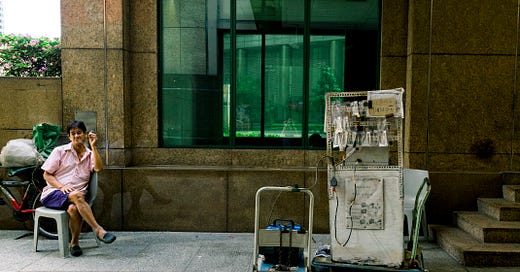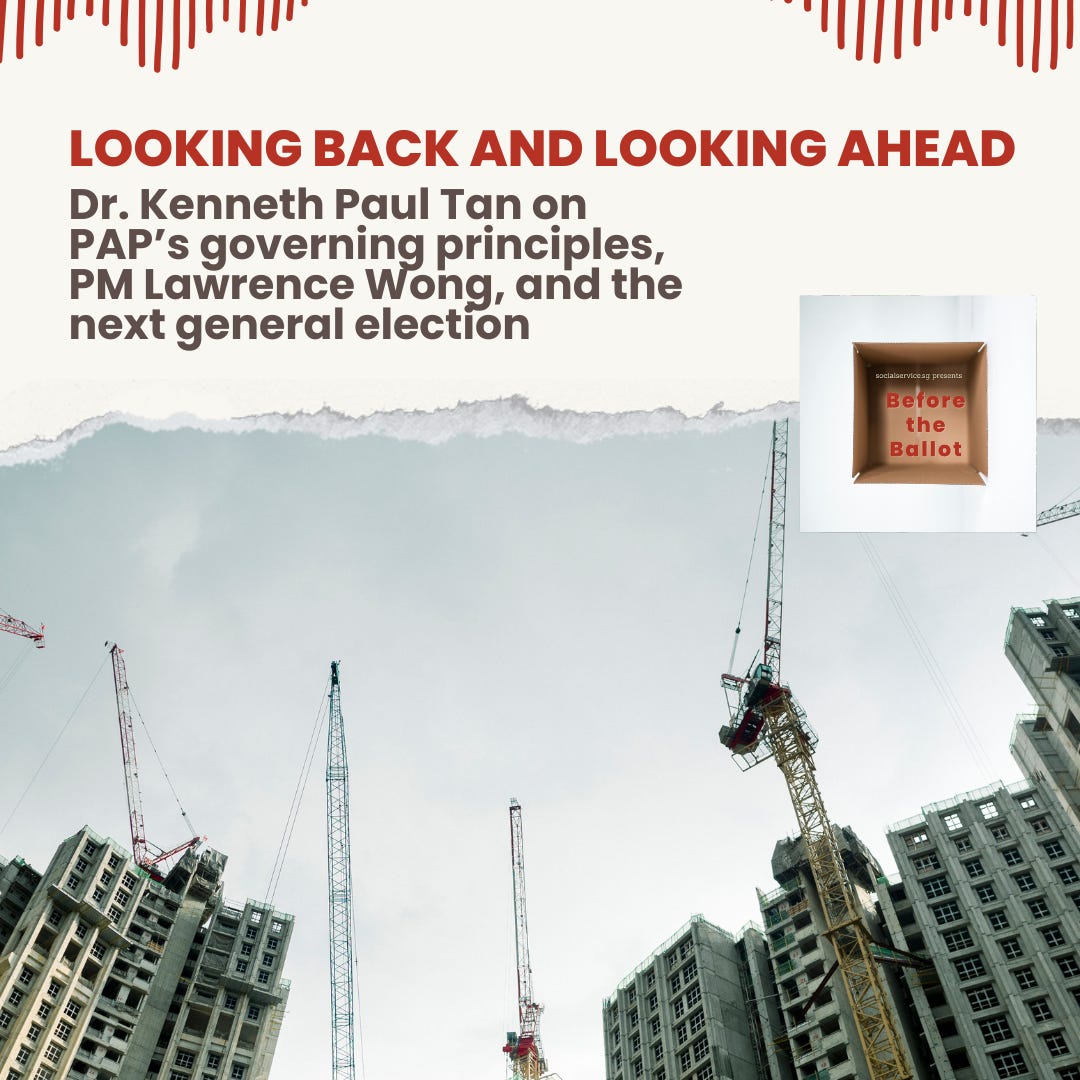Three podcast episodes on the economy, immigration, and PAP (The Nine Days, GE2025)
“It’s the economy, stupid?”
(Disclaimer: Opinions expressed are solely my own and do not express the views or opinions of the Singapore-based social service and non-profit organisations with whom I work or consult.)
We’re at the halfway mark of the GE2025 campaign, and – unsurprisingly – the discourse remains centred on bread-and-butter issues (especially the cost of living), immigration, and the ruling People’s Action Party (PAP). As such, I’m sharing three socialservice.sg podcast episodes focused on these issues, highlighting key insights and excerpts:
“It’s the economy, stupid?”: Inflation, incomes, inequality, and Singapore’s general elections (with Dr. Linda Lim)
Singapore, first? Issues of migration, citizenship, multiculturalism, and nationalism in Singapore (with Dr. Rebecca Tan)
Looking back and looking ahead: Dr. Kenneth Paul Tan on PAP’s governing principles, PM Lawrence Wong, and the next general election
“It’s the economy, stupid?”
Inflation, incomes, inequality, and Singapore’s general elections (with Dr. Linda Lim)
How do the economy and economic conditions influence electoral outcomes, both broadly and in Singapore? What can we understand from Singapore’s ranking as one of the world’s most expensive cities as well as the country’s Consumer Price Index, or the CPI? And if the fundamental root cause of Singapore’s low wages can be attributed to widespread cheap sourcing and the influx of foreign workers from very low-wage neighbouring countries, how do we address that problem?
To answer these questions and more, we host Dr. Linda Lim, Professor Emerita of Corporate Strategy and International Business at the University of Michigan. We previously hosted Dr. Lim on this podcast in 2020, in an episode focused on the minimum wage, Singapore’s Progressive Wage Model, and low-wage labour in the country.
In GE2025, a contestation between “objective” and “subjective” economic evaluations is also coming into focus. Dr. Lim reflected on this, in the episode:
“In Singapore, the problem is that the inequality people perceive and experience is not captured in statistics. We see increased numbers of rich people, especially foreigners, throwing their money around, buying whole floors of luxury [condominiums], fleets of luxury cars, luxury retail, while housing prices climb beyond my affordable range. My food and utility bills, hawker stall prices, go up, not to mention GST. I’m just not going to be happy …
I just want to be able to continue consuming what I consume, without it being priced out of my range, without having to constantly downsize. I don’t want to drive a Lamborghini. I just want a Grab ride to be affordable. I don’t want to eat at fancy high-end restaurants. I just want my chicken rice to have the same amount of chicken it had last week. I don’t want to live in Ridout Road or any GCB. I just want to be able to afford an HDB flat. I also want to be able to meet my aspirations for higher consumption in the future.”
Listen to the episode with Dr. Lim.
Singapore, first?
Issues of migration, citizenship, multiculturalism, and nationalism in Singapore (with Dr. Rebecca Tan)
Issues of migration, citizenship, multiculturalism, and nationalism have featured prominently in both our politics and elections. With Dr. Rebecca Tan of the National University of Singapore, we take a deep dive into these issues. Fundamentally, she asks, what is fair and what is right? And how do we treat individuals more equitably?
Specifically, we zoomed into five key events in Singapore’s past decade: First, GE2011; second, the 2013 Population White Paper; third, the 2013 Little India Riot; fourth, the focus on the 10-million population figure during and after GE2020; and fifth, COVID-19 and the plight of migrant workers. After analysing these events, Dr. Tan highlights data challenges and how all the issues – cumulatively – could feature in the next general election.
In GE2025, while immigration has not featured as prominently as cost-of-living issues, references to the “foreigner” or “foreign talent” have loomed in the background:
“What I find interesting is the framing of what counts as Singaporean-ness, who is a good Singaporean, who is deserving of citizenship and belonging, and all the benefits that come from being of the Singaporean community … To see, when they talk about foreigners, especially the opposition parties, how do they draw a distinction between natives or locals and the foreigner? How do they construct who’s a good Singaporean and who’s not?
We’re going to see that in terms of public discourse, whether it’s a numerical one, but also kind of a more value-laden one about Singaporean-ness, protecting the Singaporean nation, and so forth.”
Listen to the episode with Dr. Tan.
Looking back and looking ahead
Dr. Kenneth Paul Tan on PAP’s governing principles, PM Lawrence Wong, and the next general election
On May 15, 2024, at the Istana, Singapore’s fourth prime minister Lawrence Wong took his oath of office and was officially sworn in, taking over from prime minister Lee Hsien Loong. This political transition is significant for a host of different reasons, and so we take a deeper dive with Dr. Kenneth Paul Tan of Hong Kong Baptist University. Specifically, we considered three potential electoral scenarios for Mr. Wong and his ruling PAP, and asked Dr. Tan, is it the PAP’s election to lose, or the opposition parties’ election to win?
These were the three scenarios we explored:
Most optimistically for them, Mr. Wong and the PAP do much better than they did in GE2020, scoring scores five to 10 percentage points higher than they did in 2020?
They do about the same as they did during GE2020, losing a small handful of seats, a GRC here, maybe two or three SMCs there, but still maintaining their supermajority in parliament.
Finally they do much worse. The PAP is close to losing or even loses its parliamentary supermajority.
Additionally, in a recent journal article (open access), Dr. Tan further detailed “a series of high-profile scandals in recent years have eroded the PAP’s long-standing reputation for incorruptibility.” The scandals include the Ridout Road saga, corruption case involving former transport minister S. Iswaran, handling of TraceTogether data, SimplyGo initiative, attempted NTUC Income-Allianz deal to privatise the former, ACRA-NRIC lapse, as well as SingPost saga. Dr. Tan added:
“These examples illustrate how the PAP government’s deep entwinement with key institutions and policies means that operational failures, lapses in transparency, and public dissatisfaction often reflect directly on its leadership. Collectively, these incidents set the stage for the upcoming 2025 general elections, which will serve as a critical test of the PAP’s ability to navigate its evolving legitimacy crisis …
At least two narrative strategies are likely to dominate the coming election. First, opposition parties will leverage public discontent over PAP’s fourth generation leadership and recent scandals to position themselves as a credible and necessary check on the government and an alternative to PAP’s technocratic elitism. Second, the PAP is likely to reinforce its traditional narratives of national security, economic stability, meritocracy, multiracialism, and pragmatism, while leveraging its significant influence over mainstream media to vilify critics and political rivals, ensuring its narratives continue to dominate public discourse. It will emphasize the dangers of political experimentation, particularly in an era marked by global uncertainty. However, these PAP narratives may struggle to resonate with a populace that increasingly perceives them as outdated and disconnected from contemporary realities.”






